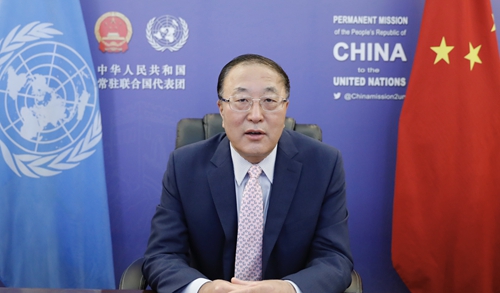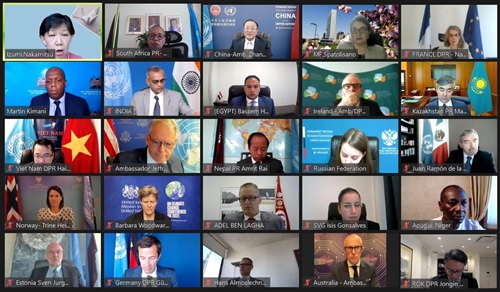| Ambassador Zhang Jun Chaired Arria-Formula Meeting on Emerging Technologies |
| 2021-05-17 04:20 |
|
The Permanent Missions of the People's Republic of China and the Arab Republic of Egypt, the Republic of Kenya, Mexico, the Republic of South Africa, the United Arab Emirates to the United Nations co-hosted an Arria-Formula Meeting on "the Impact of Emerging Technologies on International Peace and Security" on May 17. The meeting was chaired by Ambassador Zhang Jun, Permanent Representative of China to the UN. More than 40 representatives from Member States, including Security Council members, attended the meeting. Ms. Izumi Nakamitsu, UN Under-Secretary-General and High Representative for Disarmament Affairs, Ms. Maria Francesca Spatolisano, UN Assistant Secretary-General for Policy Coordination and Inter-Agency Affairs of Department of Economic and Social Affairs (DESA) and Officer in Charge of Office of the Secretary-General's Envoy on Technology and Dr. Vincent Boulanin, Senior Researcher of Stockholm International Peace Research briefed the meeting on the impact of emerging technologies on international peace and security in light of their respective work and areas of research. The participants agreed that the development of emerging technologies concerns the future of humankind, and that all parties need to attach great importance to emerging technologies, seize opportunities and make full use of them, and respond to challenges and better control risks, so as to ensure that emerging technologies benefit people across the world. It was a prevailing view among participants that all parties need to advocate the development and benefit-sharing of emerging technologies in the spirit of openness and inclusiveness and through international exchange and cooperation, and prevent digital gap. The parties expressed support for multilateralism and enhanced dialogue and discussion on the development, use and global governance of emerging technologies through multilateral platforms such as the UN.
Ambassador Zhang said, the rapid development of emerging technologies is leading to a new round of scientific and technological revolution, and injecting strong impetus into human progress. Emerging technologies bring both opportunities and challenges. It is a daunting task for us to find better ways to develop, use, and govern emerging technologies to allow them to benefit people around the world while keeping risks under control. To this end, China wishes to propose the following: First, we need to promote innovation-driven development, and comprehensively improve the development and application of science and technology in all countries to narrow the digital divide. All countries must be fully engaged in the process of global technological development, to ensure that the advances in science and technology benefit all, especially developing countries. We need to strengthen capacity building through the application of emerging technologies to raise all countries' capability to fight the pandemic, tackle climate change, and maintain food, energy and data security. Second, we need to create favorable conditions to encourage healthy competition and prevent the monopoly on technology. All countries should pursue open development, and meet the challenges in the process of development. Unilateralism, protectionism and technological hegemony should be firmly opposed. We need to uphold international fairness and justice, promote equal and mutually beneficial cooperation, and avoid blockades and barriers to technology. Third, we need to strengthen global governance to better regulate the development and application of emerging technologies. More efforts should be made to formulate relevant international instruments to fill the gaps in rules, norms and order. State governments should consult together, contribute together and share benefits together. We should practise multilateralism, encourage active participation of multiple stakeholders, and increase dialogue and cooperation to jointly formulate international norms and rules on emerging technologies. Fourth, we need to fully recognize the potential risks and challenges of emerging technologies to better maintain international peace and security. We need to ensure that technological innovation complies with the law and universally-recognized international norms. We must ensure emerging technologies are of the people, by the people and for the people. Special attention should be paid to the use of emerging technologies in armed conflicts. We must prevent emerging technologies from falling into the hands of terrorist groups or being used to spread disinformation and hate speech. It is necessary to strengthen the use of emerging technologies in UN peacekeeping operations. Fifth, we need to strengthen coordination to support the central role of the UN. The UN should pay more attention to emerging technologies, and further study and explore the establishment of a democratic, transparent, and inclusive framework for international cooperation and governance from the perspectives of peace, development and security. UN agencies should strengthen coordination to better seize the opportunities and tackle the risks and challenges brought by emerging technologies. Ambassador Zhang emphasized that emerging technologies are becoming a new engine of economic development, a new area of international cooperation, and a new issue of global governance. He called on all parties to work together to expand consensus and coordinate actions to jointly ensure that emerging technologies advance the well-being of humankind. Arria-formula meeting is a flexible and informal mechanism for Security Council members to exchange views with United Nations Member States and interested parties on issues of common concern. The meeting today was held at the initiative of China, Presidency of the Security Council for the month of May. It was the first ever Arria-formula meeting on emerging technologies. |
| |||||||||||||
| |||||||||||||

